At the moment, a few buzzy topics include augmented and virtual reality, general and voice-based artificial intelligence, and smart home devices. And, with the dawn of 5G -- a cloud-based high-speed wireless network -- tech innovation won't be slowing down anytime soon. In fact, a Deloitte study notes that many marketing firms are ramping up their information technology processes because of it. With all the technologies out there, it's hard to cut through online chatter and determine which innovations are mostly just hype and which might actually change the way we market. To give you a bird's eye view of some of the most buzzed-about innovations that could impact marketers in the near or distant future, I've collected 45 stats related to four types of emerging technology.
Augmented and Virtual Reality
For years, researchers have hypothesized that virtual reality, which provides viewers a completely immersive and interactive 360-degree visual experience, will hold 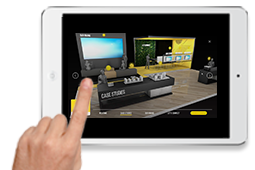 the best opportunities in gaming, entertainment, and academic industries.
the best opportunities in gaming, entertainment, and academic industries.
Meanwhile, experts have also thought that augmented reality, a partially immersive but still interactive experience, will thrive in the world of branding and marketing.
We have already seen these AR and VR predictions come to fruition as the gaming industry continues to announce games for VR headsets and brands have used AR to allow customers to preview products -- such as furniture -- in their own homes.
Here are 14 stats that demonstrate the growth and opportunities of AR and VR.
- The AR/VR market is currently estimated at $1.6 billion (IDC)
- In 2019, 42.9 million people in the US used a VR product, and 68.7 million people used an AR once monthly. (eMarketer)
- Seven in ten media planners want to add AR to their strategies in the future. (Vibrant Media)
- In a 2018 study based in the U.K. and U.S., 90% of participants knew what VR was while only 65% were aware of what AR was. (GlobalWebIndex)
- 42% of people who use a VR headset at least monthly say they used a mid-range device such as the Google Daydream or Samsung Gear VR. (GlobalWebIndex)
- In 2018, 88% of companies with budgets between $100 million and $1 billion were already experimenting with different forms of AR. (Deloitte)
- A quarter of VR users believe it has a strong potential for brands and marketers. (GlobalWebIndex)
- While 43% of people who report using VR headsets once monthly say they own their own device, 35% of once-monthly VR users say they use a family or friend's device. (GlobalWebIndex)
- 71% of consumers would prefer to shop at stores with an AR experience (Lumus Vision)
- 64% of consumers say VR has the most potential in gaming, while 52% recognize its potential in Film and TV. (GlobalWebIndex)
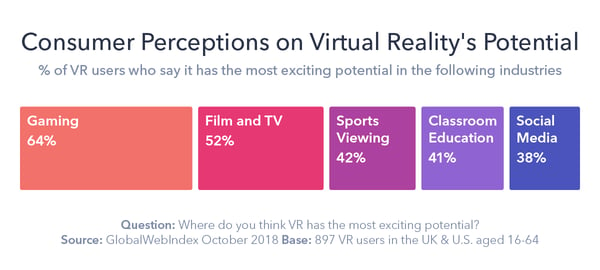
Image Source: GlobalWebIndex
- In 2018 mobile AR made $3 billion globally, in part due to purchases related to the mobile app Pokemon Go. (Digi-Capital)
- It's estimated that AR platforms such as mobile and AR glasses-related apps will hit 2.5 billion installs in 2023. (Digi-Capital)
- Meanwhile, VR platforms are expected to see 30 million installs across devices by 2023 (Digi-Capital)
- Snapchat's Q3 2019 Earnings Report notes that over 600,000 AR Lenses have been created through the company's Lens Studio, This increased from 500,000 at the end of Q2. (Snap Inc.)
Artificial Intelligence
Artificial intelligence is so prevalent in 2019 that many of us don't even notice all the ways we interact with it on a given day. In fact, all of the other technologies on this list require some type of AI algorithm to work smoothly. If you're less familiar with AI, here are 12 stats to keep in mind:
- Over 37% of organizations have implemented artificial intelligence in some form. The number of industries that have implemented it has grown by 270% since 2015 (Gartner)
- In a 2019 ranking of the top 10 emerging technologies, the World Economic Forum noted, "social robots" as number two. (World Economic Forum)
- It's estimated that 80% of emerging technologies will involve AI by 2021 (Gartner)
- 40% of marketing and sales teams say that machine learning and data science-based AI will be a crucial part of their future strategies (2019 Data Science and Machine Learning Market Study)
- It's estimated that AI-based analytics and marketing software will give the average data analyst back one-third of their time, which could then be used for bigger projects or other tasks. (Gartner)
- At 2018's F8 summit, covered by VentureBeat, Facebook said there were more than 300,000 chatbots on Facebook Messenger. (VentureBeat)
- The percentage of businesses that offer chatbots could grow to 80% in 2020. (HubSpot)
- 63% of businesses say they will consider AI in the near future due to pressures related to reducing costs. (BCG and MIT Sloan School of Business)
- The facial recognition market is estimated to grow by 20% in 2020. (VisionGain)
- There's only a 1.4% chance that a marketing manager's role will be taken over by artificial intelligence. (HubSpot)
- It's estimated that this year, customers will be able to manage 85% of their enterprise relationships without working with humans. (Gartner)
- Online mentions of automation have increased by 70% year over year. (Adobe)
Voice Assistants and Smart Speakers
While voice assistants are technically a segment of AI, they've become so prominent in the emerging media world that they deserve their own section of stats.
- Over 46% of people use voice assistants. (Pew Research Center)
- More than 36% of consumers own a smart speaker. (Adobe)
- Of those who own a smart speaker, 54% say their voice assistant can easily understand them when they speak. (Adobe)
- Nearly 112 million people in the U.S. use a voice assistant once monthly across devices. (eMarketer)
- Roughly 34% of people who don't own a smart speaker are interested in purchasing one. (GlobalWebIndex)
- According to a 2018 poll conducted by HubSpot via Lucid Software, 52% of consumers say they've used a voice assistant solely on their phone. (HubSpot)
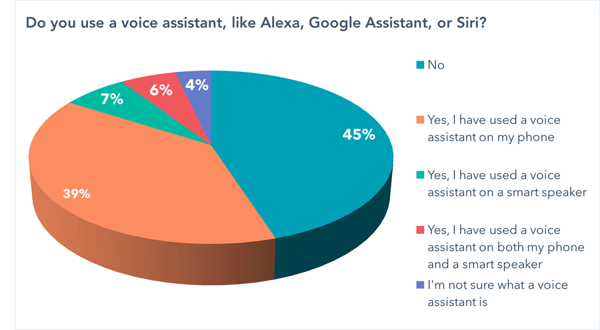
Data Source: Lucid Software
- Millennials are the heaviest users of voice assistants, but usage is growing across age groups. (eMarketer)
- In a late-2018 test where the Amazon, Google, and Apple voice assistants were asked 800 questions each, all understood over 99% to 100% of the questions. (Loup Ventures)
- In the study noted in the above bullet, Google was named the "smartest" voice assistant because it answered more than 86% of the questions correctly. (Loup Ventures)

Image Source: Loup Ventures
- In Q2 of 2019, Amazon shipped 6.6 million of its smart speakers, maintaining the lead over competitors like Google. (Canalys)
- Amazon Alexa, the voice assistant associated with Amazon Echo smart speakers, now has over 100,000 Skills globally. (Voicebot.ai)
- By 2023, digital voice ecommerce is expected to triple to an $80 billion industry. (Juniper Research)
- Between August 2018 and February 2019, smart speaker ownership increased by 4% (Adobe)
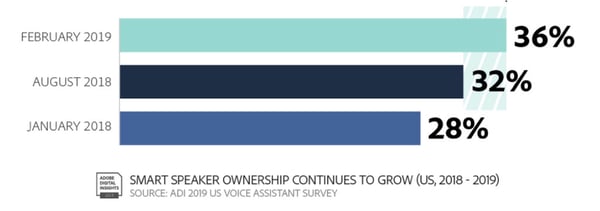
Source: Adobe
Smart Devices and Appliances
While you may not realize the significance that smart appliances and devices could have on marketing, this is something that I and my colleagues have been paying close attention to. Although this space is still young, it's already seemingly providing interesting opportunities to bigger brands.
As you can imagine, devices like smart TVs could provide great potential for content marketing and branded media, However, a more unique example of an appliance that could provide brand potential is the smart refrigerator.
"I’m excited to see how a smart fridge that can tell me when my avocados are about to spoil can be leveraged by a brand to give me information that might serve me in that particular information, says Amanda Zantal-Wiener, a senior content strategist who creates content for HubSpot that covers news and trends.
But, Zantal-Weiner's excitement doesn't end at smart-home appliances. She's also fascinated by the world of smart cars
"Until we start to see self-driving cars on the road, the idea of connected cars can also be used to help me do more than mindlessly scroll through my phone when I’m using a ride-hailing service, by serving as a distribution channel for real-time, relevant information during that trip. Everything is connected, and I’m excited to see which brands are able to adapt to that earlier on in a way that actually helps customers,” Zantal-Wiener explains.
While the smart appliance space is still fairly nascent and harder to report on statistically at the moment, here are a few interesting stats that highlight why you should keep these technologies on your radar.
- According to a Fluent Survey, 55% of internet users already own some type of smart device. (Fluent)
- The same survey found that the most common device was a smart television, which 38% of participants owned. The next most commonly owned devices were lighting (17%), thermostats (16%) and security systems (14%), and kitchen appliances (7%). (Fluent)
- 31% of people ages 18 to 34 and 38% of people over 35 say that their main purchasing concern related to smart appliances is cost. (Fluent)
- Consumers over the age of 35 are more worried about hacking and data security on smart appliances than 18 to 34-year-olds. (Fluent)
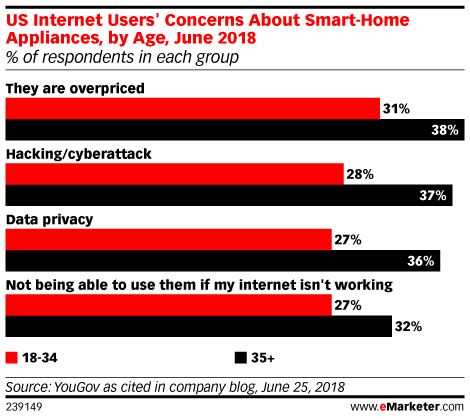
Image Source: eMarketer
- The average cost of a smart-home device is expected to drop by 52% by 2023 (Juniper Research)
- In 2018, 70% of TVs sold globally were smart TVs. (Statista)
Navigating the Future of Marketing
Yes, creating voice assistant skills, leveraging AI, and building branded AR/VR experiences might be pretty inaccessible and costly to your company right now and in the near future.
But, if you want to continue to innovate your brand, or be a competitive marketer in the far future, you'll want to keep up with how technology and marketing possibilities are evolving. By keeping up with marketing innovation news, you'll be more prepared to adopt new technologies when they are accessible in the future.
For some detailed guides on emerging technologies that could or are already impacting brands, check out blog posts on artificial intelligence, voice technology, Snapchat, smart devices, and chatbots, and video game marketing -- which can leverage of few of the technologies noted above.
Written by Pamela Bump - @PamelaBump https://blog.hubspot.com/marketing/emerging-technology-stats






